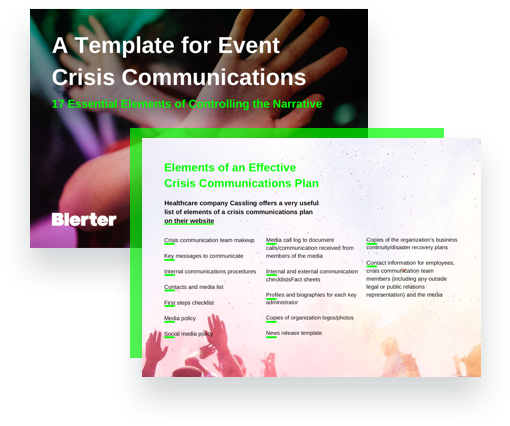You’re nearing the last hurdle, the last several months of planning for this one event has sucked every last ounce of energy from you, even a few extra grey hairs have decided to spring to life.
It’s all you've known for such a long period of time so your way of living has become entirely revolved around this one mission.
Due to the strenuous nature of event planning, interaction with friends and family has become non-existent and ‘me’ time has gone out the door.
You keep telling yourself once the event is finished, all will go back to normal…
Unfortunately, this isn’t always the case. Instead of experiencing that feeling of satisfaction and sense of relief, you’re hit with this dull, empty, and depressed feeling. If you’ve felt this before, don’t freak out, you're not the only one. The commonly used term ‘post-adrenaline/post event blues’ has managed to squirm it’s way into numerous professions, especially within the events industry.

Post-event blues or PAB (post-adrenaline blues) have been renown to strike when you’ve spent a long period of time on a work-related or personal task. Vigorous working regimes that end suddenly tend to be the instigators.
Many occupations like event planners, professional athletes, actors and musicians all have similar schedules and their long strenuous routines usually end up being impacted by PAB. It’s more common than you may think and the trigger can be subject to biological and psychological effects.
Biologically speaking, if you step away from a stressful environment that you’ve been a part of for a long period, there’s a chance that the abrupt withdrawal of stress hormones could be the crux of PAB. According to addictions research, rebound or withdrawal symptoms are very prominent when peoples lifestyle/work routine drastically change.
Psychologically speaking, this is more of a mental battle. This can be the result of not knowing what to do once the big event has passed. You’ve created so much hype around it that all your attention and focus has been directed at this one main goal but nothing has been planned post-event. Everything you do after will seem anti-climatic, slowly introducing a dull, empty feeling.
However, it is important to note that post-event blues isn’t a permanent effect. If you can tackle the issue early on it may only last for a week or two or it may not even arise at all. If you plan and prep yourself for the days/weeks following the event the transition period won’t seem like such a monumental task.
Go back and check your notes. Start to outline the things that worked well and look to either change or remove the things that didn’t. It’s important to do this in reasonably quick concession, you’ll want to run through it whilst it’s fresh in your mind.
![]()
You’ll be feeling attached to the event so you don’t necessarily have to stop working on it. Spend a bit of time capitalising on your notes and try and gather further feedback, as this will help identify the things you need to improve on for next time.
Survey’s, emails, social media polls, phone calls, and your team are just some of the ways you can receive feedback so don’t be shy about getting the feelers out, constructive criticism is a good thing.
What were the positives that stuck out to you during the event?
What would you do to improve the event for next time?
Was the content sent out prior to the event helpful?
Did the setup and location improve the event? If no why?
What are the chances of you attending one of our future events?
Receiving different perspectives and opinions from people attending and working at the event will help target areas that you can either avoid or improve on for future events.
Not everything goes to plan. No doubt there are going to be some negatives to come from the event so try to embrace them and treat the overall event as a learning experience.

It’s easy to get caught up in the bad but it’s important to reflect on the positives. Preparing yourself for the outcome will help you better manage your expectations so the impact is has on you isn’t as harsh.
Focusing on the negatives too much will distract you from reestablishing a new plan that will help you overcome the difficulties you encountered. For example, criticising yourself for not hiring enough staff won’t help the situation, but knowing how many staff you will need for the next event will ensure you either resolve or improve the issue.
It sounds cliche, but taking some time to relax after the event is an absolute must. However, the challenge you may face is knowing when the right time is to take a break.

The week following your event, you’ll no doubt have a few things that need sorting before the event is fully finished. So if you were planning on a quick getaway to a beach resort, it’s probably best to reschedule to at least a week after the event.
When you’re setting aside some time for a break, look to focus on doing things that require a minimal amount of effort. You want to relax your mind and body and begin to completely unwind so you can remove all that stress and tension. Maintaining a healthy diet will also help replenish your body and ensure it’s functioning freely again.
Jetting off to another country for a break might be the reward itself, but whatever the way, treat yourself. Put a reward in place after you’ve completed such a big job, this will help create a positive frame of mind for when you get into your next project.

Try not to speak about the event, well at least not in a negative light. Your friends and family will most likely not want to listen to you complain after going weeks or months without seeing you. This is the time to talk in a more light-hearted manner, treat this like your usual, fun Saturday evening.
If you do talk about the event, mention the positives and what went well, you should be proud of what you’ve accomplished over such a long period of time.
Goal setting is great for motivation. Once your event is complete, it’s important to create new goals, whether it be for your next event or just individual goals outside of your work environment.
Setting goals ads a fresh perspective and outcome for what you want to achieve going forward. You’re re-creating your purpose again and when you’re able to work towards goals that provide value, all of a sudden those post-event blues start to disappear.
Putting goals in place will distract you from over-analysing your event just been. Looking forward to new objectives is the best way to move forward so take a breath, relax and start to ease your way back into creating some new ideas for future events.
Don’t stress if you’re one of those people that can’t just instantly turn a blind eye to your work once it’s finished. Being super engaged with your job is a positive, the important thing to note is that experiencing the ups and downs in your work or personal life isn’t unusual.

Work-life can be a rollercoaster and by managing your expectations during and after your event you can ride the high’s and low’s more effectively. To ensure you’re in a good head space after the event, re-engage with the activities you enjoy doing but haven’t been able to experience recently.
The underlying issue for experiencing post-event blues is the lack of motivation. Don’t let your life revolve around the one event you’re working towards, as you won’t have anything to look forward to once it’s finished. By being in control of your work/personal life, you’ll be able to create a well-balanced routine. This will help with productivity and will ultimately ensure that those post-event blues are confronted and dealt with.


Streamline your delivery, be prepared for things that can go wrong and increase crew engagement at your next event.